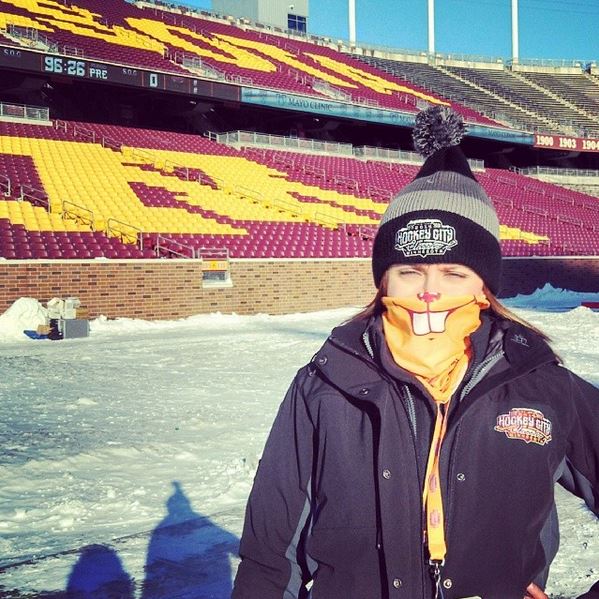Posted by Stephanie Jensen on 2nd Jun 2017
Planning a Great Event - Keys to Event Marketing Success
 (Photo: This was a few years ago while working at my previous marketing agency - it was sunny, and VERY COLD! The University of Minnesota gave away these Goldy Gopher face masks to their student section for an outdoor hockey game. Needless to say, they were a big hit and generated lots of buzz and user generated content on social media.)
(Photo: This was a few years ago while working at my previous marketing agency - it was sunny, and VERY COLD! The University of Minnesota gave away these Goldy Gopher face masks to their student section for an outdoor hockey game. Needless to say, they were a big hit and generated lots of buzz and user generated content on social media.)
Event marketing is a great way to engage with your audience and build a relationship based on their in-person interaction with your products or services.
Prior to joining Lifetime Creations, I spent my career in marketing and events that were often sponsored by large brands. I’ve learned that whether you’re a Fortune 500 company or a small business, most of the same key principles apply. Here are a few important things to consider when planning any event for your business or organization.
1. Define your goals.
Is the goal to create general awareness of your brand, or do you have a specific service/product you’re trying to promote? These are obviously two very different objectives. Other goals might include:
- Brand awareness when you’re entering a new market
- Introduce a new product or service
- Increase conversions on existing products
- Generate leads
- Show customer or employee appreciation
- Spotlight a charitable partner
These are just a few examples, but the most important thing is to make sure you can measure the results. Is it a successful event if you collect 500 leads? Gain two new accounts? Make 1,000 impressions? How can you valuate each scenario to determine your ROI?
2. Determine what you want your audience to take away.
Knowing your audience and how you want them to feel walking out of your event are things you’ll need to identify first along with your goals.
- What feelings do you want your audience to have that day, one month from now, or one year later?
- Will they be motivated to share their experience with others, especially through social media? The University of Minnesota face mask above is a great example.
A great event will leave you with a group of brand ambassadors who will be excited to talk about their experience, so make it as easy as possible for them to do so - i.e. photo opportunities, use of hashtags, promotional items, etc.
3. Identify your partners.
Your venue, caterer, and other vendors should all have the goal of making your event a success. Things to consider:
- Is this an attractive location for my audience? i.e. Is it easy for them to get to? Is the venue aligned with our brand and target market?
- Are food and refreshments being provided? Is it expected?
- What displays, signage, or other decoration is needed? How will we incorporate our branding?
- How am I marketing the event? Who can help me spread the word to the right groups of people?
- Do I need marketing handouts or other giveaways? What is the best use of this budget?
4. Plan, delegate & over communicate
There is no worse feeling than having event day arrive and discovering there’s been an oversight. You can never be too prepared or organized - it often makes or break your event.
- Create a list with every actionable item involved in preparing your event. No detail is too minor. Assign it to a team member with a deadline, and build in room for unexpected delays.
- Communicate with your team and partners on a regular basis to make sure milestones are being met. Frequency may vary depending on how much time there is until event day.
- Use a project management system like Basecamp to keep track of details.
5. Following up
Be sure to follow up with your audience post-event. They will have invaluable feedback and are typically eager to share when asked for their thoughts.
- Send attendees an email immediately after the event with a survey to gauge their experience and ask for candid feedback. Leave an area for open-ended comments and suggestions. This is a great opportunity to learn and improve.
- When possible, follow up individually with any any clients or leads to thank them for attending and solicit feedback.
- Hold a debrief with your team and partners to discuss what went well, what didn’t, and what could be improved next time.
In all of these scenarios, don’t wait too long to ask for feedback - get it while the experience is fresh on everyone’s minds.
If you’re planning an event, we would love to help with your branded item needs including promotional products and printing. Contact us to get started and discuss your goals.